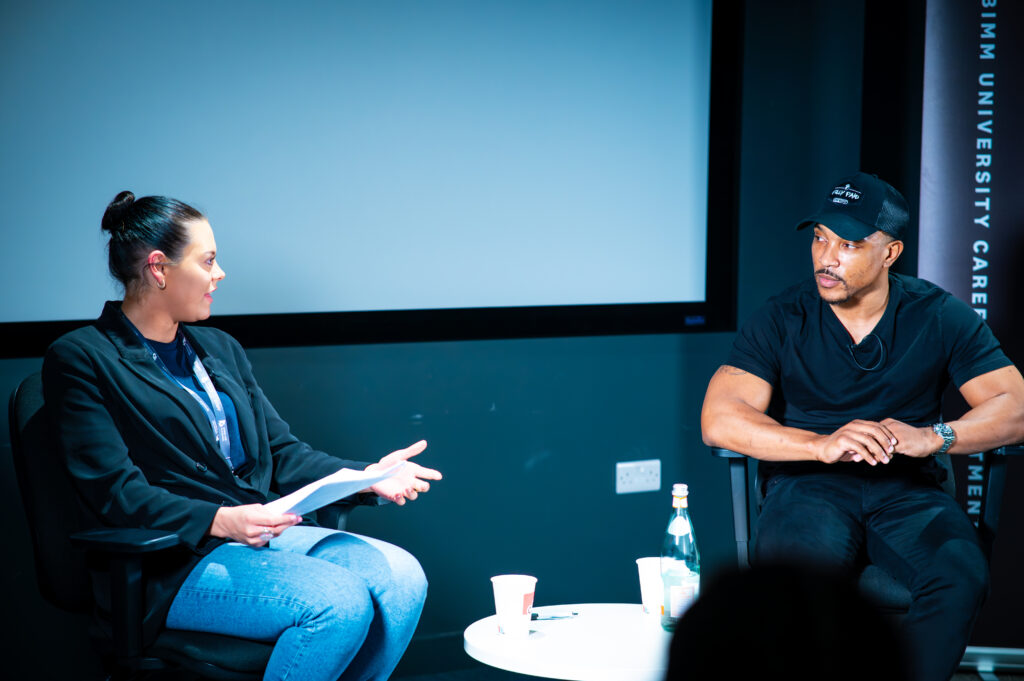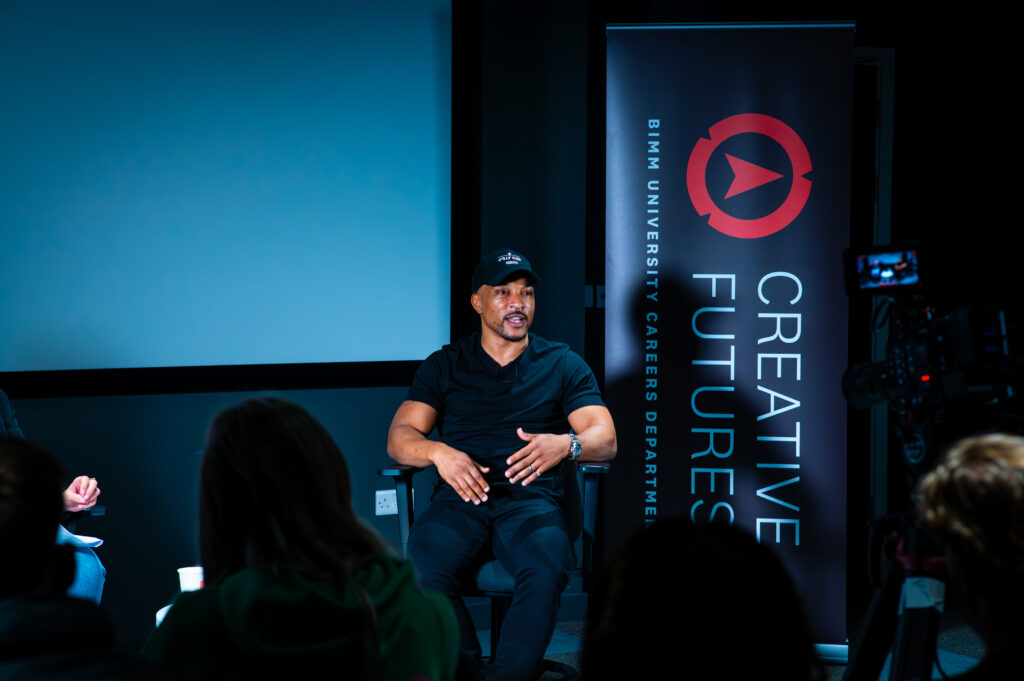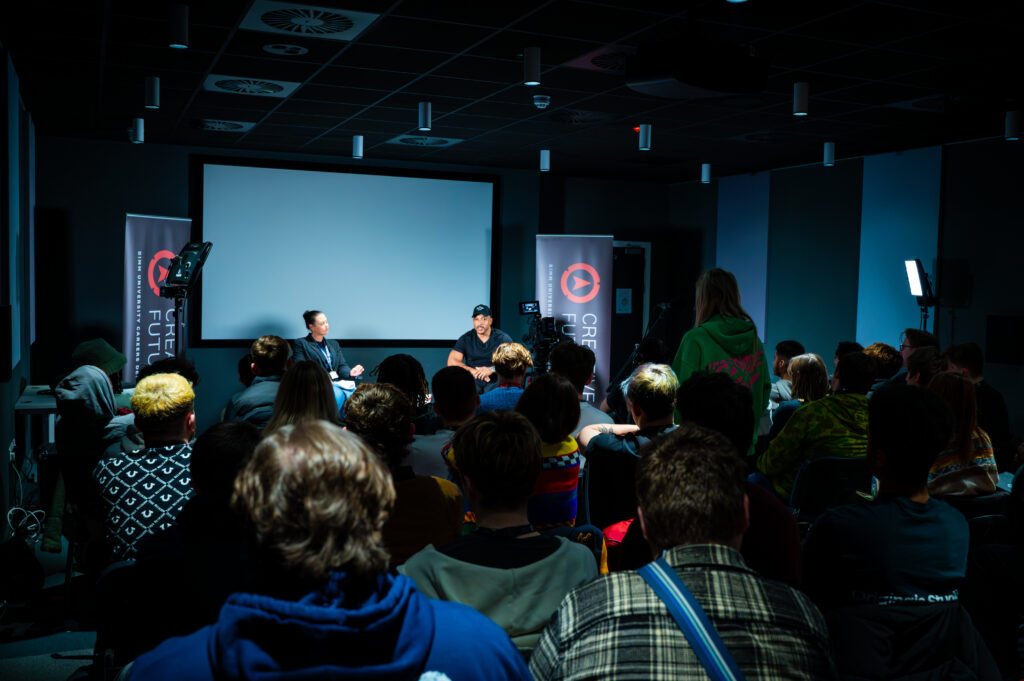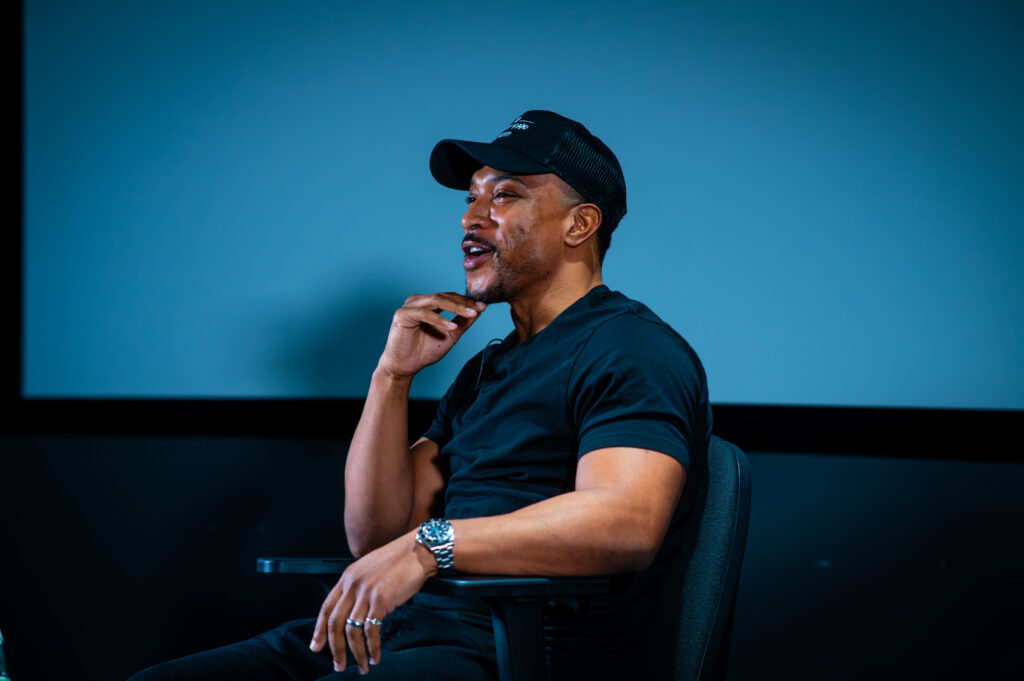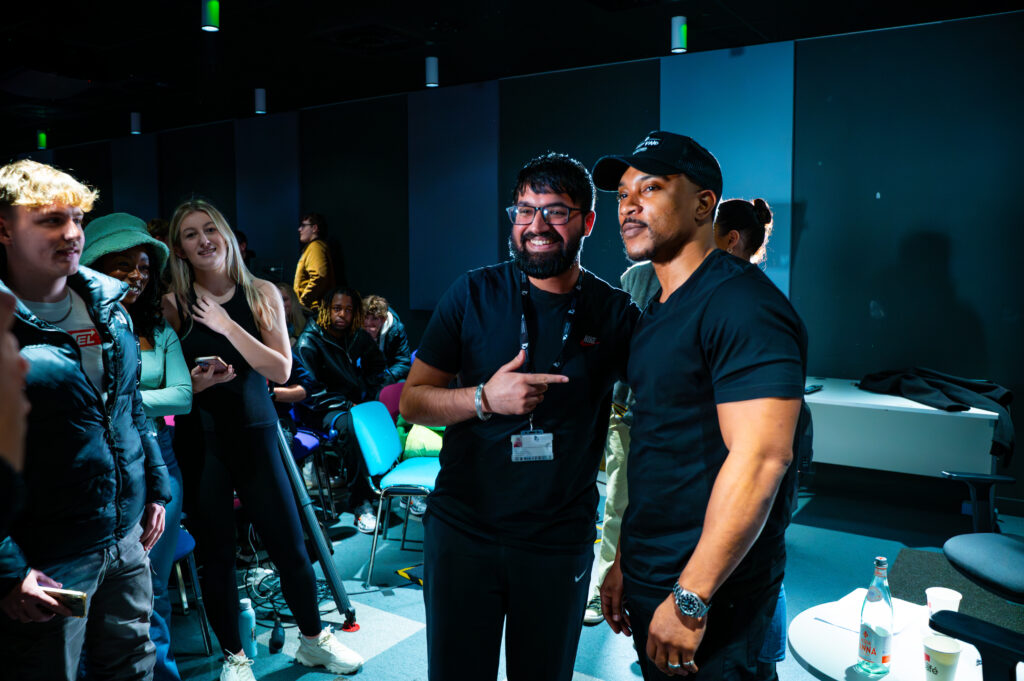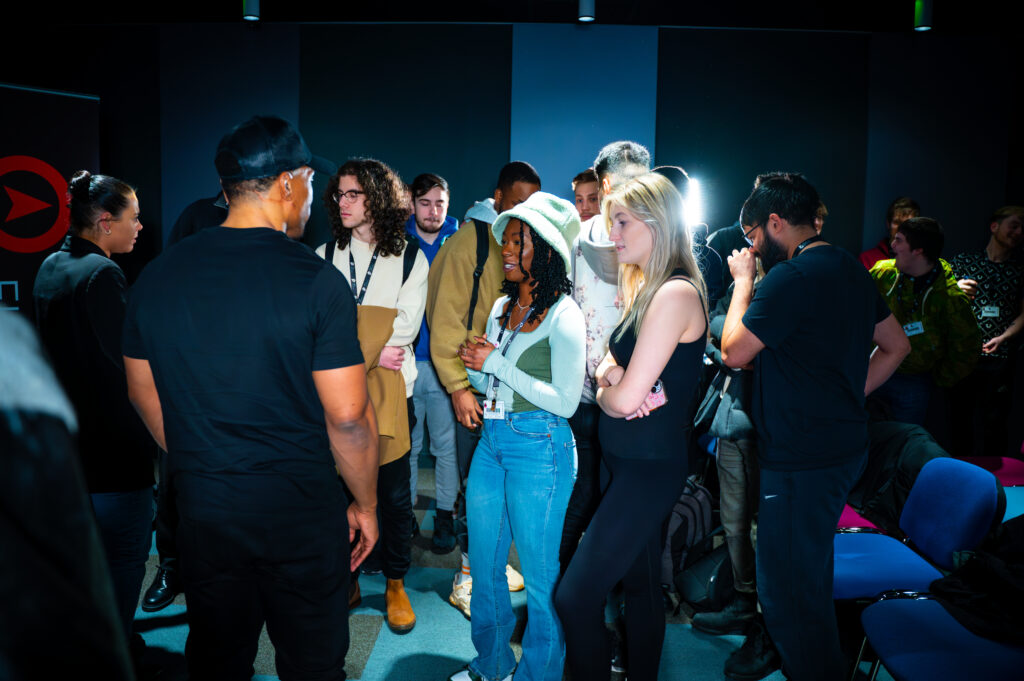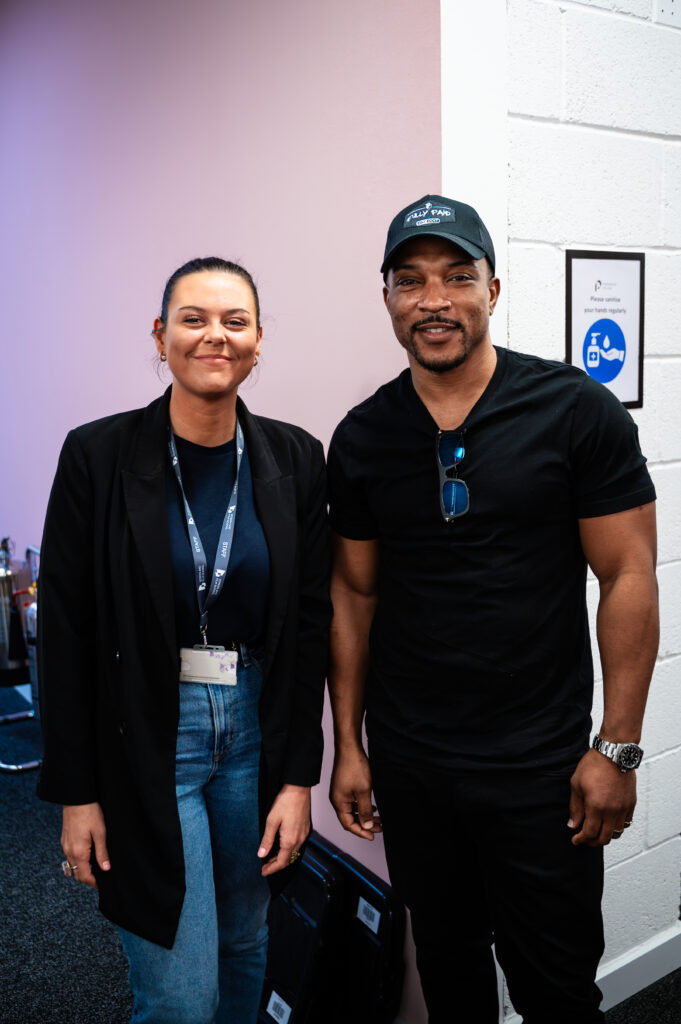In conversation with Ashley Walters, a.k.a. Asher D
We were delighted to recently welcome the incredible Ashley Walters to our Birmingham campus for an exclusive in-person masterclass with our students.
Ashley Walters is an award-winning actor, director, producer and rapper whose credits include Top Boy, Bulletproof and Speed Racer. Using the stage name Asher D, Walters rose to fame as a member of British garage group So Solid Crew and was a lead vocalist on their number one hit ‘21 Seconds’.
Industry Insight
The masterclass was hosted by Careers Manager, Lucy Carey at Screen and Film School Birmingham and was attended by students in person and across our campuses online.
Ashley told us how he broke into the industry, offered his advice to budding actors and directors, and shared some details of his upcoming projects. He also described his perfect Sunday, expressed his deep love for The Goonies, and taught us all a valuable lesson about not being late.
Ashley began by talking about British crime drama Top Boy, in which he starred as Dushane for all five seasons:
“The last season was bittersweet, because it had been such a huge part of my life. The first season was 2011/2012, so I’d grown up on that show. When I was offered that part, I was refusing to do parts like that, because I just felt like as a black actor in the UK I was being typecast, basically – I was always being offered the role of the gangster or whatever. Which I could do all day long, but it wasn’t challenging for me, and I don’t think it was moving the game forward. But when I read that script, I said to my agent ‘I’ve got to do this one’.”
He was then asked about the importance of representation in the film and TV industry, and what he envisions for the future:
“When I first started acting, there were probably five black actors, you could count them on your hand. My mum would literally be like ‘Ashley, get in here, there’s a black person on the TV!’ It was that bad back then; we are in a completely different place now.
“What’s going to cement what we are trying to achieve by this push is allowing black creatives on the other side to have a voice… If there are more black writers, if there are more black directors, if there are more black producers in the game, I think that’s when you start to see things change properly.”
Student Questions
Lucy then opened up the conversation to the floor, giving students the opportunity to ask Ashley some questions.
What advice would you give to minority filmmakers coming up within the industry and how do we find our voice?
“Being true to who you are… I think in this industry, leaning into who you are and telling stories about who you are, or about a community or a culture that you know very well, and introducing that to us in the world, is the best way to get through the door. And then after that point, you can expand and broaden your stories into other fields.
“I think it’s about being true to yourself: leaning into that, and not being afraid to lean into that, is what’s going to generate that space for you to grow even further.”
What made you think acting was the career for you?
“It didn’t become a viable job for me until I did Bullet Boy. And it was the moment I was winning that award that I was like, ‘yeah, I could do this.’ What you’ve got to bear in mind is that seven months to a year before that, I’d just been released from prison. In the papers I was the gun-toting gangster that no one should go near, and then I’m standing at the podium winning the Most-Promising Newcomer Award for an independent film, with a room full of people that didn’t look like me applauding me, who were actually the ones that were not letting me in the door seven to eight months before.”
Let’s say an actor gets a role in a series, and in the fourth season their character has to do something that you think they wouldn’t do. How do you overcome this?
“I think that it’s about boundaries and open conversations. At this point, I mean in 2024, you should be working with producers that are going to sit down and talk you through things like that, and you should be able to state how you feel about it. The best idea wins… This is not about power or control, it’s about saying how you feel, talking it, letting the room understand it, and then coming up with a compromise or solution as to how we move forward.”
After discussing his great admiration for Lenny Henry, Ashley talked about his own production company, SLNda, and what they hope to achieve:
“I want to create the change that I can’t see happening in the industry… we try to focus on the stories – I hate to sound corny and cheesy – that are positive stories. In our company we’re all ethnic minorities who… have thrived in this country, and I think a lot of the time the stories that you would expect from someone like me as a director or actor would be about the negative side of what my experience has been. But I want to talk more about how the transition from jungle to garage changed my life, and how much fun I had through that experience; I want to talk about the successful career I have; I want to talk about the beautiful wife and kids and family that I have, the stories of romance and stuff like that.”
Finally, Ashley inspired us all with his suggestions about how we can rectify the mistakes of past generations within the film and TV industry:
“I think the biggest mistake we made is not sharing data and information. So, when I was probably your age maybe younger and I was in the game, none of the other black actors came to me and went ‘right, how’s this going for you?’, ‘this is what I experienced a few years before…’, ‘this is how you can navigate that…’, ‘this is how you should act in this space…’
“I wanted to learn from them, and if they had given me certain information, I may never have made some of the mistakes I made. What you guys have got to do is, all the knowledge that you gain from this experience, make sure you’re passing it down to the others that are coming underneath you, and that’s what’s going to keep this thing flourishing and continuing to grow.”
Lucy Carey, our Careers Manager, was overjoyed with the masterclass:
“We loved having Ashley at Screen and Film School Birmingham, the students revelled at having such a prominent figure in the industry sharing his advice on how to thrive as a filmmaker. Ashley provided an inspiring masterclass which left the students feeling motivated. Ashley also spent some time looking over student work providing feedback and tips on how to improve. Overall a great day at Screen and Film School.”
We would like to thank Ashley for his time, and for the invaluable advice and insight that he has given our students. Ashley has just finished directing a 12-part series called A Thousand Blows, which was written by Steven Knight and stars Stephen Graham. The show will be released on Disney + in the coming months, so we will certainly keep our eyes peeled.
Are you interested in being a part of the new legacy at Screen and Film School Birmingham?
Sign up to one of our Open Days:
Find out more information on our courses by clicking below:

